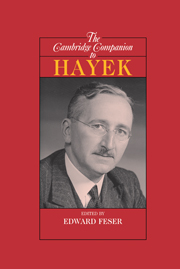Book contents
- Frontmatter
- Introduction
- 1 Hayek and the Austrian tradition
- 2 Hayek on money and the business cycle
- 3 Hayek and market socialism
- 4 Hayek and Marx
- 5 Hayek versus Keynes: the road to reconciliation
- 6 Hayek on knowledge, economics, and society
- 7 Hayek and Popper: the road to serfdom and the open society
- 8 Hayek’s politics
- 9 Hayek the philosopher of law
- 10 Hayek and liberalism
- 11 Hayek and conservatism
- 12 Hayek on the evolution of society and mind
- 13 Hayek on justice and the order of actions
- 14 Hayek the cognitive scientist and philosopher of mind
- Guide to Further reading
- Bibliography
- Index
1 - Hayek and the Austrian tradition
Published online by Cambridge University Press: 28 January 2007
- Frontmatter
- Introduction
- 1 Hayek and the Austrian tradition
- 2 Hayek on money and the business cycle
- 3 Hayek and market socialism
- 4 Hayek and Marx
- 5 Hayek versus Keynes: the road to reconciliation
- 6 Hayek on knowledge, economics, and society
- 7 Hayek and Popper: the road to serfdom and the open society
- 8 Hayek’s politics
- 9 Hayek the philosopher of law
- 10 Hayek and liberalism
- 11 Hayek and conservatism
- 12 Hayek on the evolution of society and mind
- 13 Hayek on justice and the order of actions
- 14 Hayek the cognitive scientist and philosopher of mind
- Guide to Further reading
- Bibliography
- Index
Summary
There are two elements of Hayek's background that justify our considering him an Austrian economist: first, that he was raised and went to university in Vienna in the first three decades of the twentieth century, and second, that when he finally decided on economics as his field of study, he was trained within the Austrian tradition in economics.
Hayek spent about a third of his life in Austria, mostly in his early days. When he was thirty-two he moved to England, where he would live for nearly twenty years. (He would later say that it was the place he felt most at home, both intellectually and emotionally.) From 1950 through 1962 he lived in the United States, and then moved to Freiburg, Germany, where (aside from a five-year period in Salzburg, Austria - an altogether depressing time for him, both emotionally and intellectually) he would spend the rest of his life. So the first place to look for Hayek as a distinctly Austrian figure is at the formative early period. Accordingly, I will discuss his family background, his early schooling, and his university days in Vienna. Within economics, of course, the adjective “Austrian” also signifies a specific school of thought. Once he had decided that he would become an economist, Hayek received training that would make him very much a product of that school. So a second part of the story is to examine what being trained as an Austrian economist might mean.
- Type
- Chapter
- Information
- The Cambridge Companion to Hayek , pp. 13 - 33Publisher: Cambridge University PressPrint publication year: 2006
- 1
- Cited by



